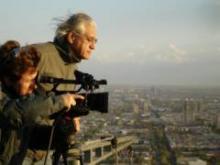Patricio Guzmán

Patricio Guzmán’s figure as a documentary filmmaker emerged in the mid 70s with the devastating force brought by the triptych organized under the single rebellious cry The Battle of Chile. The indelible mark the film left in the history of documentary filmmaking (not just in Latin America, but in the whole genre’s) also managed to live on until today. Not only did he managed, by way of his talent and curiosity, to escape the possible label of “political documentary filmmaker” but he also got to analyze the way in which the past defined –as it still does– the way Chilean people lives.
Born in Santiago de Chile in 1941 and based in Paris years ago, his continuous moves across the Atlantic Ocean are only a sample of both the intellectual and physical worries that usually lead him to examine History and the roots of the Latin American way of life. After studying Film both at the Catholic University’s Film Institute and the Madrid Official Film School, Guzmán provides the first example of that uncontainable militant and social strength with his first film El primer año, a film about the first 12 months of Salvador Allende’s government that, thanks to the help of Chris Marker, was released in France and Belgium and gave him the chance of establishing a connection with this French filmmaker that would later turn out to be essential for the making of The Battle of Chile, his next and most renowned film.
In the following years, his need for staying constantly in motion and investigate foreign lands resulted in valuable films like La cruz del Sur, Pueblo en vilo (based on the book by Luis González), La isla de Robinson Crusoe –in which the filmmaker went out to the Pacific Ocean in search of the island Daniel Defoe had imagined– and Madrid, which turned into images his close relationship with that city. On the other hand, he also continued digging into the scars and memory of his country with a series of valuable films that provided both historical and cinematographic contributions: En nombre de Dios, about the fight for human rights carried out by the Catholic Church during Pinochet’s military dictatorship, and, finally, those the Argentine public is more familiar with (which were released and screened in local festivals), Chile, The Obstinate Memory, The Pinochet Case and Salvador Allende.
LL
Date and Time














 0800-333-7848 / M to F / 10:00am to 08:00pm
0800-333-7848 / M to F / 10:00am to 08:00pm